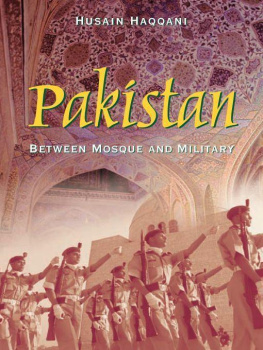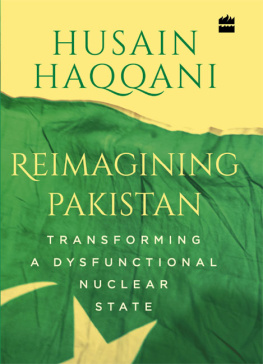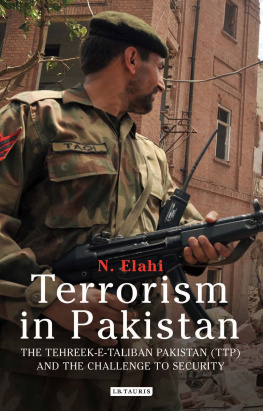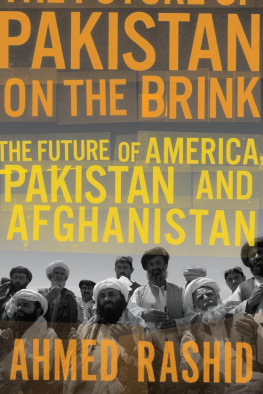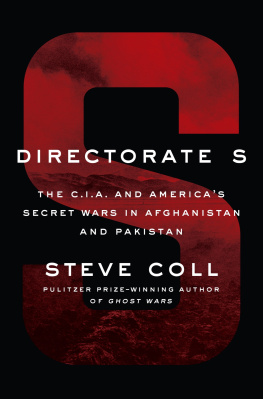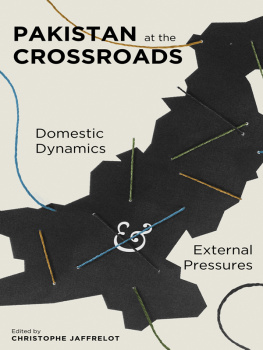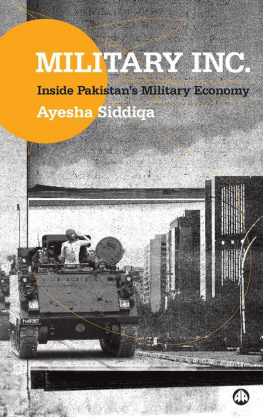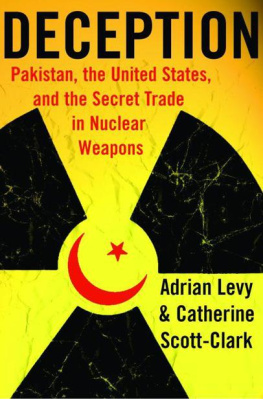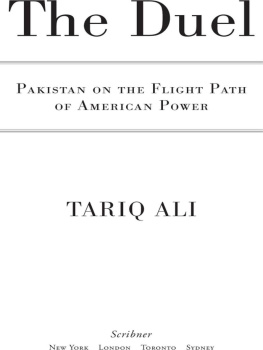MAGNIFICENT
DELUSIONS
MAGNIFICENT
DELUSIONS
Pakistan, the
United States, and an Epic History
of Misunderstanding
.....
Husain Haqqani

PUBLICAFFAIRS
New York
Copyright 2013 by Husain Haqqani
Published in the United States by PublicAffairs, a Member of the Perseus Books Group
All rights reserved.
No part of this book may be reproduced in any manner whatsoever without written permission except in the case of brief quotations embodied in critical articles and reviews. For information, address Public Affairs, 250 West 57th Street, 15th Floor, New York, NY 10107.
PublicAffairs books are available at special discounts for bulk purchases in the U.S. by corporations, institutions, and other organizations. For more information, please contact the Special Markets Department at the Perseus Books Group, 2300 Chestnut Street, Suite 200, Philadelphia, PA 19103, call (800) 810-4145, ext. 5000, or e-mail .
Editorial production by Marrathon Production Services.
www.marrathon.net
BOOK DESIGN BY JANE RAESE
Set in 12.5-point Bembo
Library of Congress Control Number: 2013948306
ISBN 978-1-61039-318-8 (e-book)
FIRST EDITION
2 4 6 8 10 9 7 5 3 1
TO MY LATE PARENTS SAEEDA AND SALEEM HAQQANI,
AND MY WIFE, FARAHNAZ ISPAHANI,
FOR THEIR LIFELONG LOVE, SUPPORT, AND ENCOURAGEMENT
Contents
A doubtful friend is worse than a certain enemy. Let a man be one thing or the other, and we then know how to meet him.
Aesop, Aesops Fables
MAGNIFICENT
DELUSIONS
O ver the last two decades US-Pakistan relations have often been described as Americas most difficult external relationship. Although the two countries have been nominal allies dating back to Pakistans independence in 1947, their relationship has never been free of friction. Even in its heyday during the 1950s and 1960s, the US-Pakistan partnership was far from an alliance based on shared values and interests; instead, each of the two partners was always preoccupied with confronting different enemies and pinning different expectations to their association.
Pakistans motive in pursuing an alliance with the United States is driven by its quest for security against its much larger neighbor, India. Pakistan has repeatedly turned to the United States as its most significant source of expensive weapons and economic aid. Although, in the hope of winning US support for Pakistans regional aims, Pakistani leaders have assured US officials that they share the United States global security concerns, Pakistan has been repeatedly disappointed because the United States does not share Pakistans fears of Indian hegemony in South Asia.
For its part, the United States has also chased a mirage when it has assumed that, over time, its assistance to Pakistan would engender a sense of security among Pakistanis, thereby leading to a change in Pakistans priorities and objectives. The United States initially poured money and arms into Pakistan in the hope of building a major fighting force that could assist in defending Asia against communism. Pakistan repeatedly failed to live up to its promises to provide troops for any of the wars the United States fought against communist forces, instead using American weapons in its wars with India. Furthermore, US hopes of persuading Pakistan to give up or curtail its nuclear weapons program or to stop using Jihadi militants as proxies in regional conflicts have similarly proved futile.
Three American presidentsDwight D. Eisenhower, John F. Kennedy, and Lyndon B. Johnsonhave asked the question: What do we get from aiding Pakistan? FiveJimmy Carter, George H. W. Bush, Bill Clinton, George W. Bush, and Barack Obamahave wondered aloud whether Pakistans leaders can be trusted to keep their word. Meanwhile in Pakistan, successive governments have spent a lot of time trying to figure out how to maintain Pakistans freedom of action while depending on US aid. But neither country has changed its core policies nor have they given up the hope that the other will change.
The US-Pakistan relationship has depended largely on cordial ties between leaders and officials who have often misunderstood each others intentions and limitations. Whereas Pakistanis have often benefited from the American tendency to ignore history and focus only on immediate goals, Americans have often assumed that building up Pakistans economic and military capacity provides them leverage even after periodically finding out the limits of US influence. And both sides have their own stereotypes about each other, traceable back to Pakistans emergence as an independent country.
During that period, soon after emerging from British Indias bloody partition in 1947, Pakistans leaders confronted an uncertain future for their new country. When most of the world was indifferent to Pakistan as the potential homeland of South Asias Muslims, India antagonized Pakistan without compromise or compassion. Because of this, soon after independence Pakistans founding fathers, encouraged by some British geostrategists, decided that they would continue to maintain the large army they had inherited even though the new nation could not afford to pay for it from its own resources and did not immediately face a visible security threat. Given Pakistans location at the crossroads of the Middle East and South Asia and its relative proximity to the Soviet Union, Pakistanis assumed that the United States would take an interest in financing and arming the fledgling new state. Thus, the gap in expectations between American and Pakistani leaders that has bedeviled their relationship over the last sixty-five years should have been apparent right at the beginning, when Pakistans founding father and its first governor-general, Muhammad Ali Jinnah, asked the United States for a $2 billion aid package in September 1947, but the United States gave Pakistan only $ 10 million in assistance that first year.
International relations thinkers like Hans J. Morgenthau and George Kennan did not see Pakistans value to the United States as an ally. After all, Pakistans primary concern, competing with India for regional influence, was not a strategic concern for the United States. But after Dwight D. Eisenhower was elected president in 1952, his secretary of state, John Foster Dulles, embraced the idea that Pakistan could be influenced into sharing US strategic concerns in exchange for weapons and aid.
Primarily because of geopolitical considerations, the United States has enlisted Pakistan as an ally on three occasions: during the Cold War (19541972), the war against the Soviets in Afghanistan (19791989), and the war against terrorism (2001present). In each instance the US motive for seeking Pakistani alliance has been different from Pakistans reasons for accepting it. For example, after the Soviet invasion of Afghanistan the United States saw an opportunity to avenge the Vietnam War and bleed the Soviet Red army with the help of Mujahideen, militant Islamist radicals trained by Pakistans Inter-Services Intelligence (ISI) and funded by United States Central Intelligence Agency (CIA). Pakistan, however, looked upon the military action in Afghanistan as a Jihad to be used as the launching pad for asymmetric warfare that would increase its clout against India.
Since my days as a student at Karachi University, I found the anti-American narrative that was prevalent all around me difficult to believe. I spent many hours at the American Center Library, reading books and articles that exposed me to different perspectives of historic events. Unlike my colleagues, I could see through the absurdity of conspiracy theories.
When student protestors burned down the US embassy in Islamabad in 1979, 1 was a student leader allied to Islamists on my campus. A huge demonstration was organized at short notice, with university buses commandeered to transport protestors to the US consulate in Karachi. Several student speakers urged the mob to burn down the consulate, and the mob was ready to do so until I was called on to speak. My speech, citing the Quran and demanding that ascertainment of facts precede action, saved the US consulate (and its library) from meeting the same fate as the embassy in Islamabad.
Next page

